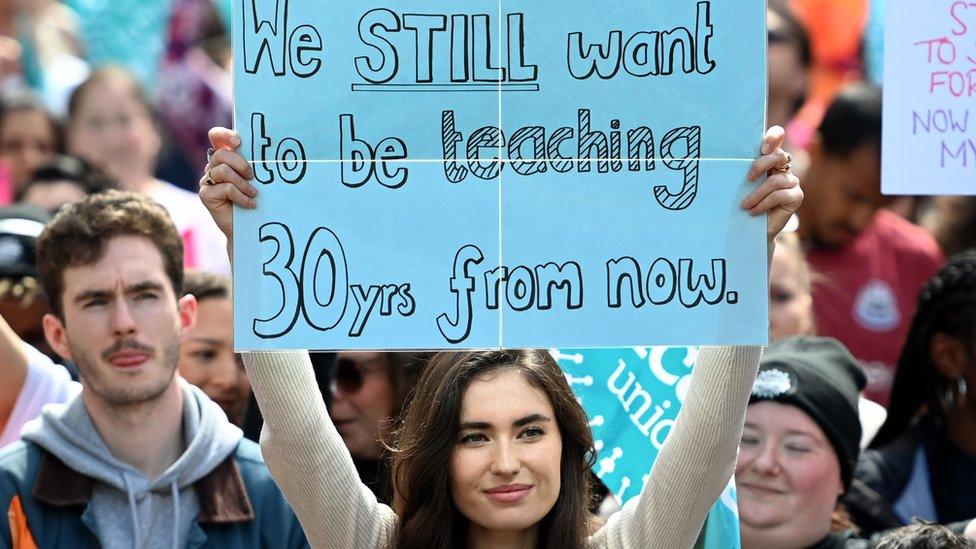Teacher strike: Gloucester teacher has 64 pupils in one class
- Published

Teacher Wayne Partridge has 64 pupils in his maths class
A teacher says he is striking because he is unable to provide his class of 64 pupils with "a really good education".
Wayne Partridge, head of maths at Henley Bank High School in Gloucester, joined the sixth National Education Union (NEU) walkout since February.
He said the number of pupils in his class means he is not able to give them one-to-one attention.
A Department for Education (DfE) official said: "Schools are receiving significant additional funding.
"This is part of the extra £2bn of investment we are providing for 2023-24 and 2024-25."
Mr Partridge said the school did not have enough funds to hire another teacher, which makes him "feel bad" for pupils.
"It's really difficult for me, because we still want them to get a really good education," he said.
"They still get taught well, but as a person responsible for their education I'm not able to do the best job that I can," added Mr Partridge.
A spokesperson for Henley Bank High School said: "All students in our school are receiving extremely high quality lessons delivered by subject specialists."

NEU members from Henley Bank High School are striking over pay and conditions
There are restrictions on class sizes for younger children, with those aged five to seven required to be taught in a class of 30 or fewer.
But there is no such similar rule for secondary schools.
The DfE said the average class size for secondary was currently 22.4 pupils.
However, research last year found 75% of teachers said class sizes were getting bigger.
The two NEU walk-outs being held this week - there is another on Friday - come after teachers voted to reject a pay offer in April.
Another maths teacher at Henley Bank, Daisy Carter, said they were not just striking over pay.
"Absolutely everything in schools has been cut. Classes are getting bigger, trips are getting cut," she said.
Ms Carter said a group of teachers did not get paid for taking pupils on a recent Duke of Edinburgh Award trip.

Daisy Carter said teachers in the UK work some of the longest hours in Europe and give up a lot of time for free
Teachers are calling for above-inflation pay increases, plus additional money to ensure any pay rises do not come from a school's existing budgets.
"Parents and the public understand the need for school funding and they absolutely support us," said Ms Carter, who told the BBC she earns £28,000.
"We cannot take another pay cut. The salaries for teachers are much less than they have been in the past.
"It's insufficient for the work we do," she added.

Teachers are striking across the west of England
A DfE spokesperson added that upcoming funding would take school funding to "its highest level in history next year, as measured by the Institute for Fiscal Studies".
They added: "We hugely value the work of teachers.
"The independent School Teachers' Review Body has submitted its recommendations to government on teacher pay for 2023/24.
"We will be considering the recommendations and will publish our response in the usual way."

Follow BBC West on Facebook, external, Twitter, external and Instagram, external. Send your story ideas to: bristol@bbc.co.uk , external
- Published15 April

- Published5 July 2023

- Published3 May 2023

- Published2 March 2023

- Published19 April 2022
